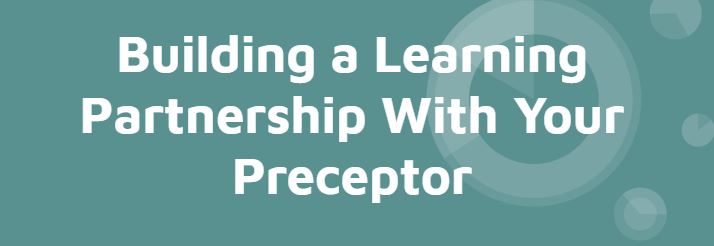Dietetics:CommunicationCollaboration/Building a Learning Partnership With Your Preceptors 2019

Header image, recommended height=800pixels by width=300pixels
Creative Commons photo courtesy of Flickr user UBC Student Services
Relevance of topic to dietetics student learning
- We will be interacting with preceptors everyday during year 5
- Creating a successful learning partnership with your preceptor is essential in creating a supportive and productive learning environment
- ICDEP competencies covered by this topic:
- 1.03 Practice according to organizational requirements
- 1.04 Practice within limits of individual level of professional knowledge and skills
- 1.05 Address professional development needs
- 2.01 Select appropriate communication approaches
- 2.03 Use effective oral communication skills
- 2.04 Use effective interpersonal skills
- 2.05 Contribute to the learning of others
- 2.06 Contribute productively to teamwork and collaborative processes
Summary of key principles
Defining Learning Partnership
- “A learning partnership is a collaborative process where the mentor and mentee work towards achieving specific, mutually agreed upon goals with the intention of developing the mentee’s skills, abilities, knowledge and thinking. It is a mutual discovery process where both bring something to the relationship and both get something out of it, that will broaden their perspective” (Zachary, 2012)
- Tips From Current Preceptors
- Be curious and ask questions
- Be prepared and know what your gaps in knowledge are
- Show enthusiasm and interest
- Be accountable and respectful
- Make sure you have a common understanding of what is expected and your goals
Learning Styles
- Knowing your learning style will help you to strategize your own learning
- Communicating your style to your preceptor can help them to teach you better
- Types of Learning Styles:
- Auditory-Musical (Aural)
- Visual
- Verbal
- Kinesthetic
- Read/Write
Dealing with Conflict
- Conflict is a natural part of any relationship
- Dealing with conflict appropriately can help strengthen a relationship
- Conflict may occur as a result of miscommunication, different expectations or contrasting preferences
- To help minimize potential conflict, it is important to:
- Have open communication
- Ask questions and clarify expectations and instructions
- Resolve and address conflict collaboratively
- Managing conflict constrictively can help reduce stress levels and increase productivity and performance
| Do | Don't |
|---|---|
|
|
Emotional Intelligence (EI)
- Emotional intelligence can help us prevent conflict and manage it constructively. It can also positively affect our performance, relationships, and physical and mental health.
- The definition of emotional intelligence is “the ability to listen and empathize, the ability to recognize and regulate emotions in oneself and others, and the ability to communicate effectively” (Kumaran 2012).
- Questions to ask yourself:
- What emotion am I feeling?
- How are my thoughts and attitudes leading to this emotion?
- What emotion is the other person expressing?
- How can I positively influence this interaction?
- Five Domains Of EI
- Self-awareness: Develop through reflective practice
- Self-regulation: ensure your actions align with your values, hold yourself accountable
- Motivation: Be optimistic and committed to your work
- Empathy: Try to understand the other person’s position, and recognize and respond to their feelings
- Social skills: Openly and clearly communicate, build rapport, offer affirmation
Digital media learning resource #1
Here is an infographic that describes the 5 Learning Styles
Digital media learning resource #2
Link to video
https://www.youtube.com/watch?time_continue=3&v=KCsS5-QJTVs
This video is a synthesis of ways to improve the dietetics student's relationship with the preceptor.
Includes practical tips and emotional intelligence
Online resources for further learning
Performing Under Pressure, Emotional Intelligence Video:
https://www.youtube.com/watch?v=NMtJBIExxyo
Managing Emotions:
https://www.selfgrowth.com/articles/Definition_Managing_Emotions.html
Handling Conflict:
https://www.thebalancecareers.com/handling-conflict-in-the-workplace-1986749
Student authors
Authors: Lisa Evans, Raihan Hassen, Sarah Walters, Naomi Johnson, Melanie Newman, Natalie Sousa
Developed: March 2019
